Subscribe by Email
-
Recent Posts
Category Archives: Books
Too Much Happiness
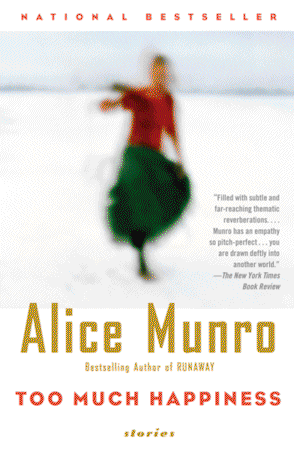
Shortly after marrying a Canadian and becoming a Canadian resident, my sister-in-law thrust a book into my hands by Alice Munro, one of her favorite authors. I had known about Munro, the acclaimed Canadian writer who had won many awards for her short stories (including the 2009 Man Booker International Prize), but I am embarrassed to say before now I had not read any of her collections. Her stories were often in the New Yorker and I might have read her there, but I knew living in Canada that her books would be essential reading for my own cultural introduction to my new country.
Her short-story collection “Too Much Happiness, ” which is her most recent from 2009, didn’t disappoint but rather exceeded my expectations from the praise that preceded her. I guess I don’t often read short stories (though I have liked Raymond Carver’s, Jhumpa Lahiri’s and Somerset Maugham’s) but delving into hers were easy and absorbing, like falling into a world that sweeps you up. I was a bit surprised that this genteel author (78 years old at the time) from rural Ontario wrote about characters that drew you in so completely to such ominous or unsettling predicaments. Murderers, deviants and misfits pepper the stories of “Too Much Happiness,” which reminded me a bit of the dark aspects of Flannery O’Connor’s or Joyce Carol Oates’s stories.
In “Child’s Play,” two summer camp friends live with the repercussions of a terrible crime they commit, while in “Face,” a boy deals with the taunts from a birthmark that covers half his head. In “Deep-Holes” a family loses touch with a son involved in a cliff-falling accident, and in “Free Radicals,” an old woman saves her neck by telling a violent burglar of her own past crime. All 10 stories in “Too Much Happiness” are quite affecting; they grab at your lapels and shake you good. But perhaps the creepy “Dimensions” and “Wenlock Edge” are the collection’s most unnerving. It’s in “Dimensions” that an incident jars a wife to finally overcome her ties to her abusive jailed husband, and in “Wenlock Edge” where a student’s sexual violation steers her to turn in another.
It’s hard not to give too much away, better just to marvel at Munro’s mastery of these potent stories. Interestingly, her last story, “Too Much Happiness,” is quite a departure from the others. It’s based on a real person Sophia Kovalevsky, who was a prominent Russian mathematician in the latter 1800s, and deals with her life in the days before her death. Though interesting, I thought the other more contemporary, Canada-set stories pulled at me more. But regardless, I’m going to add Munro’s other collections to my reading list, particularly “Runaway” from 2004 and “The View From Castle Rock” from 2006. She’s definitely a writer to be treasured and one I’m so glad, no matter which side of the border, not to have missed. Continue reading
Posted in Books
2 Comments
Bring Up the Bodies
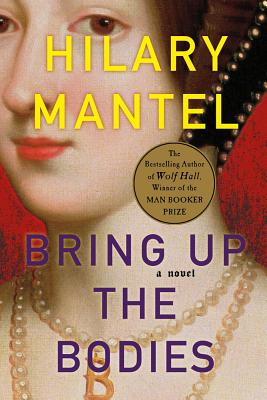
I coincidentally was reading Hilary Mantel’s historical novel “Bring Up the Bodies” around the same time as I was watching the “Diamond Jubilee” celebration, commemorating Queen Elizabeth II’s amazing 60 years on the throne of England. Perhaps there’s not a direct correlation, but I’m definitely getting my fix of English royal history lately, with its influential monarchs and their reigns of power, accomplishments, struggles and scandals. It’s fascinating material to be sure.
Mantel’s latest novel about Thomas Cromwell, the court of King Henry VIII and the destruction of Queen Anne Boleyn has received unanimous gushing reviews as did her previous book of their earlier years, “Wolf Hall,” which was awarded the 2009 Man Booker Prize. The print critics love her, with Janet Maslin of the New York Times going as far to say that “Bring Up the Bodies” is “this year’s best beach read” and the “one must-read of the season.”
Best beach read? Hmm, I had to read it. But now that I’m done, I can tell you, if you like “War and Peace” or Shakespeare on the beach then perhaps you will definitely like this one. Otherwise, I’d stick to something lighter and easier to sink into. “Bodies” definitely has the elements of a beach book, with power plays, intrigue, rumors, gossip, revenge, adultery, violence, but it swirls around for quite a while, muting its impact. Its narrative language though beautiful by Mantel is a bit of a challenge for the beach; it’s not Olde English but it’s not exactly contemporary either. You’ll have to work a bit to get the array of characters and who is speaking when and what is being said. At times it can be a bit confusing or even a slog to read, but I did successfully plow through it and came away with a more vivid picture of the poisonous atmosphere at the court during Anne Boleyn’s last months.
You don’t have to read its predecessor “Wolf Hall” to understand “Bring Up the Bodies”; I went right to the latter one, which is meant to be the second in a trilogy — all told from Thomas Cromwell’s point of view. Cromwell was King Henry VIII’s right hand man, his secretary and power broker, who comes to believe he must destroy the Queen before she destroys him. Mantel paints him as more human than just ruthlessly evil, which is how he is often portrayed, though he’s still cleverly shrewd and harsh in the end.
The book takes place over nine months from 1535 to 1536. As it begins, Queen Anne Boleyn has replaced King Henry VIII’s first wife Katharine of Aragon with much ado, leading the King to break with the Catholic Church in Rome. All is momentarily at peace. But after three years, the king grows restless as Anne is unable to produce a male heir and he begins to favor Jane Seymour. Thereafter the Queen’s days are numbered. Cromwell uncovers a web, eventually arresting her along with five men on trumped up charges of adultery and incest (with her brother). Whether she is actually guilty as charged is a mystery preserved in the book, though it sides with it being unlikely. In an interview, Hilary Mantel has said the Queen gives the impression of being guilty, whether or not she really is, is not known.
Surely the book is quite dark; everybody’s out for themselves and trying to gain their advantage with the King and the court. It seems Machiavellian. Some have sympathies with the last Queen, while others are aligning with the future, Jane Seymour. The plot gangs up on Anne Boleyn, and it is quite chilling to read about a woman’s place then and the abuse of the court’s power — all because Henry VIII wanted a new wife. There’s not really a redeeming character in the book to latch onto, and despite what it’s about, not a lot of action. I was hoping for more. It’s mostly filled with the verbal sparring, court gossip and posturing amid its unseemingly cast. I took away quite a bit from it but not without considerable persistence and effort — something that I don’t hope for in my next (real) beach read. Continue reading
Posted in Books
9 Comments
Battle Hymn of the Tiger Mother
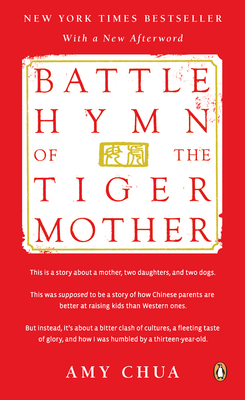
“Battle Hymn of the Tiger Mother” ignited a firestorm last year, which I successfully steered clear of until my book group picked it to discuss this week. I can tell the book group moms are ready to sink their claws into this memoir and tear it apart, knowing good and well it’s about a “tiger” mother who uses harsh parenting practices to raise and gear her two daughters for success.
No TV for them, or sleepovers, or playdates, or computer games, or grades less than an A; these girls must be fluent in Chinese and practice endless hours of piano and violin after school and even on vacations. To their mom, childhood is less about having fun than being “a training period, a time to build character and invest in the future.” The Chinese parenting approach, she says, is very different from the Western way, which values independence, creativity and questioning authority. Western kids are allowed to follow their “passion,” which just turns out, she says, to be 10 hours on Facebook which is a total waste of time and eating digusting junk food.
For the Chinese, she says, authority is always to be respected and kids’ self-esteem isn’t a concern; parents regularly criticize their kids (she refers to her daughter as garbage at one point) and expect more from them (she rejects their inadequately made birthday cards). Chinese parents also decide all their activities and what’s best for their children. Kids, in turn, obey and don’t talk back. They owe their parents everything.
Author Amy Chua sets up “Tiger Mother” as a “clash of worldviews”; there’s the weak, easy Western way of child-rearing, she seems to say, and the stronger, harder to follow Chinese approach, which she does her best to adhere to with her daughters while living in Connecticut, where she’s a law professor at Yale. Her husband, a law professor there too, plays only a small peripheral role in this memoir.
In many ways her book is like stomaching the world of a type -A drill sergeant who pushes her kids as prodigies and family to the brink. It’s insufferable in parts what she believes and how she acts. And yet I was surprisingly glad to have read it (I didn’t hate the book. It’s even well told and isn’t heartless). I don’t believe the West has all the answers on child-raising, nor by this account does the East either. Her book raises valid questions about parenting. Perhaps there’s some kind of middle ground or hybrid approach worth exploring or trying, which Amy Chua herself concedes towards the end, though she doesn’t seem ready to reconcile to that way of thinking.
She says her memoir has been greatly misunderstood; that it’s really “supposed to be funny, partly self-parody” about her own transformation as a mother. Throughout the book, she seems to know she’s an overbearing, controlling fanatic to her kids, but that doesn’t seem to stop her any; only the possibility of losing her daughter seems to affect her path, which is a bit sad. You feel for the kids, no doubt. It would be comical perhaps if it weren’t all so borderline true to what she’s like. I did laugh some because she really is a piece work, this tiger lady. Continue reading
Posted in Books
4 Comments
The Devil’s Teeth
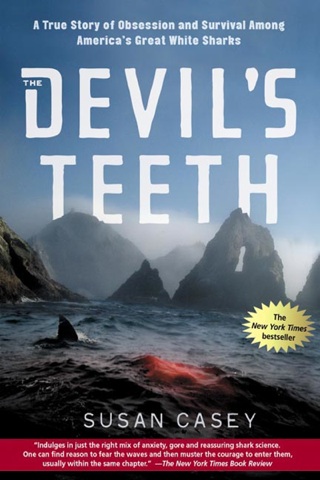
For a visit to the San Francisco Bay Area last weekend, I got caught up in the book “The Devil’s Teeth” about the Farallon Islands and the great white sharks out there, 28 miles from the Golden Gate Bridge. Published in 2005, the book had been knocking around my book shelves for years, a present from my older brother who told me I must read it. Indeed he was right, especially while in the Bay Area where I could stare out to sea, hoping to catch a glimpse of the rocky and remote Farallones on the edge of the vast Pacific.
The Farallones have long been a mysterious and dangerous island chain, where nasty storms and waves could be treacherous. Just last month tragedy struck when five crew members attempting to round the islands were killed during the annual Farallon sailboat race when waves knocked them overboard and washed their boat onto the rocks. Similarly in April 1982, six others died when a storm blasted the Farallon race.
The Farallones are not for the light of heart and only a handful of scientists are granted access to be on the southeastern island, which is a bird sanctuary. It’s a place filled with bird guano and surrounded by waters infested from September to November with great white sharks.
Such is the environment journalist Susan Casey threw herself into, joining biologists Peter Pyle and Scot Anderson on the Farallones to monitor the sharks and their attacks on seals. Her book is heady stuff, as if you can feel these 18-foot predators swimming around you under their small boat. It’s eerie and informative, giving a broad picture of the sharks, how they hunt during the day, chomp on surfboard decoys and are segregated with the larger dominant “Sisters” staying in different areas from the males. It also recounts the unlikely history of the islands where in 1942 more than 100 people from the military and government and their families once lived.
Susan Casey can write the daylights out of nature and science, but it’s her personal anecdotes and adventures of life on the island and in the shark-invested waters with the biologists and a bold sea urchin diver there that are most entertaining and gripping, especially her three-week solo stay anchored on a yacht off the island, which gets truly harrowing when a storm hits. “Even as the place was trying to kill me,” she writes early on, “I had never felt more alive.” Such sentiments capture the island’s hold on those who work and return there every year — to a place, she writes, where “only wild things came.”
In the end the price she pays to get the story amid increasing managerial restrictions on the island and others pay to continue their shark pursuits is very high. Heads roll, for sure, but luckily all get through alive. The fallout is heavy though and leaves one wanting to know more about what happened to all in the aftermath. As for the sharks, hopefully they’ll continue to come back to the Farallones and be studied for many more decades to come.
“The Devil’s Teeth” definitely made me want to read Susan Casey’s latest book “The Wave: In Pursuit of the Rogues, Freaks, and Giants of the Ocean” somewhere down the line — as she is a writer who combines science and adventure in a truly intriguing and informative way. Continue reading
Posted in Books
Leave a comment
The Art of Fielding
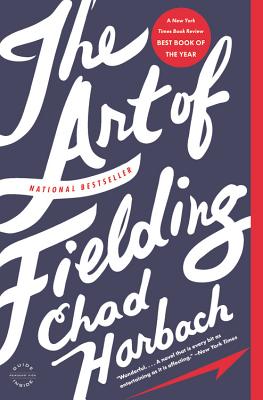
With the opening of baseball season, I sought out “The Art of Fielding” as my next read. I have long been an avid follower of America’s pastime and once worshipped Cincinnati’s Big Red Machine circa 1973 to 1979. The team’s catcher Johnny Bench is still my all-time baseball hero. So I was psyched to pick up Chad Harbach’s debut novel, which I knew just two things about: (a) that it was about baseball and (b) that it had made the New York Times 10 best books of 2011 list: a combination of which definitely piqued my interest.
But I didn’t realize “The Art of Fielding” would be a long, sprawling novel of 512 pages nor did I know its storyline, characters, or the gay and straight relationships within. I went in blind and was rewarded with a very entertaining and heartfelt read. It enticed me with its strong sense of place of a Midwestern college campus and main characters who I felt entwined to by the end to the point that I’d miss them when all was said and done.
Many probably know, the novel’s about a baseball star shortstop named Henry Skrimshander who’s recruited and mentored to play at a small college along the shores of Lake Michigan. On the field, Henry is as good as gold, tying the record for innings without an error and catching the attention of major league scouts; that is until one game a throw gets wildly away from him and beans a teammate, forever affecting the fates of five people. There’s Henry, who loses his way amid self-doubt and team captain Mike Schwartz, who’s mentored Henry at the expense of himself; and college president Guert Affenlight, a Melville scholar, who finds himself falling dangerously in love with a student, Owen Dunne, who’s Henry’s gay roommate; and finally Pella Affenlight, Guert’s daughter, who returns to the college town to start again after a failed marriage.
It’s a coming of age story primarily about male relationships and friendships, and about love and loss. It’s considerably more than just a baseball story (you don’t necessarily need to be a baseball fan to enjoy it), though the sports writing in the book is quite impressive. Author Chad Harbach definitely knows the sights, sounds and feelings around a baseball diamond, and pursues the mental aspects, as well as the blood, sweat and tears an athlete goes through with great insight. The novel is quite dark at points as the main characters all seem to be going through a tipping point or break down at the same time. It’s likely your college anxieties will resurface as you speed through “The Art of Fielding” hoping for a brighter day for Henry, Schwartzy, Guert and Pella. I also enjoyed the school’s connection to Herman Melville, which the author creatively conjures toward the beginning of the novel.
You won’t soon forget this book as it breathes considerably life into its scenes. You go through a lot amid its 512 pages, rising and falling with its cast. And though it’s long, it’s a fast, breezy read that keeps you coming back (though you might not like some things that happen) until its final conclusion plays out. Kudos to Chad Harbach for his engaging debut hit, which apparently has been optioned by HBO in the hope of turning it into a series. Continue reading
Posted in Books
10 Comments
A Night to Remember
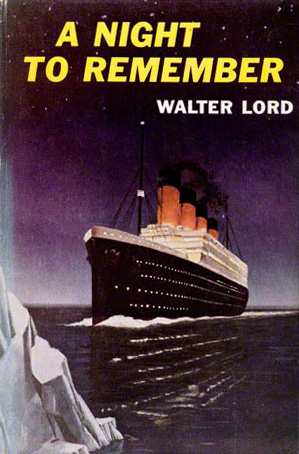
It was a hundred years ago last night at 2:20 a.m. the RMS Titanic sank after hitting an iceberg at 11:40 p.m. It’s humbling and shocking even now, thinking of the world’s biggest, fastest ship up to that point (deemed “unsinkable”) and more than 1,500 of its passengers disappearing on its maiden voyage into the icy waters of the North Atlantic. Titanic’s story is one so visual now to our imaginations, as if it were engraved into our DNA. It’s long since taken on mythological proportions.
With its 100th anniversary, I couldn’t help but take the plunge into the massive coverage of all things Titanic. I’ve seen a few Titanic TV specials recently: one on its engine room staff that worked so hard to keep the lights on; another on the iceberg that hit it; another on James Cameron’s analysis of the underwater wreck site that was found in 1985; and finally the 1958 film “A Night to Remember,” which is taken from this book of the same name.
But there’s so much more on Titanic: new research, new books, new theories; all recently banking on the 100th anniversary. But what intrigued me was to go back to the very first book on it, Walter Lord’s classic “A Night to Remember” from 1955. After all, I had never read it before this.
Indeed it is a great source for what happened on the night of April 14-15, 1912. As Lord wrote: “This book is really about the last night of a small town.” And for sure, Titanic was that big and carried that many people. It was like a microcosm of Edwardian society, with cabins and luxuries designated by class, and women and children given first seats on the lifeboats. Never again would the world be quite like this in such circumstances.
“A Night to Remember” reads as if the action were happening right then and there, making it quite dramatic as the tragedy unfolds. From the late sighting of the iceberg, to the damage assessment, call to lifeboats, distress signals, eventual sinking and freezing rescue, Lord pieces together such a vivid picture, strengthened by the 63 survivors he spoke to in writing the book. The quotes of conversations he uses, which enliven the account, are not made up but are amazingly given as remembered by survivors.
“Night” reads a bit like a Jon Krakauer book. And indeed, Walter Lord was one of the first writers to bring journalistic narrative to history, which we are so much better for. The book’s not weighed down with a lot of documentation, speculation or background (for that there are many others), but it briskly recounts in an organized, accurate way what happened and when on that fateful night and the many colorful people involved and lost. Interesting roles are played by Captain Edward John Smith, Titanic’s builder Thomas Andrews, ocean liner president Bruce Ismay, Fifth Officer Harold Lowe (who went back to pick up survivors) and Second Officer Charles Lightoller who survived by balancing with others on an overturned collapsible lifeboat.
After the ship went down, it’s amazing that some of the passengers were able to swim to a couple of these collapsible boats in the 28-degree Fahrenheit water and somehow survive until the rescue ship picked them up a few hours later. “Night” conjures scenes like these that you won’t believe and won’t be able to forget. It makes you wish you could change all the little circumstances that led up to the disaster: if only the Titanic weren’t going so fast through an ice field on a moonless night, or if only they saw the iceberg sooner, or if only the ship the Californian 10 miles away came to their distress, or if only they loaded the lifeboats with more people — or, or, or ….
It’s a great book that can do all that. My only wish is perhaps that author Walter Lord had written an afterword on it that went into the disaster’s hearings a bit. Some of the survivors’ testimony would have been quite interesting, too. But still “A Night to Remember” is quite a night, and there’s more interesting details in Lord’s book “The Night Lives On” from 1986. Sadly he died in 2002, but not before consulting on that other Titanic movie you might have heard of. Apparently Lord once crossed the Atlantic on the RMS Olympic, the Titanic’s sister ship in 1926. So perhaps that is where he got his zest for capturing such a sea story.
If you happen to see the 1958 film of it, which you should, watch for Sean Connery, apparently he is amid the chaos as a deck crewman. Continue reading
Posted in Books
4 Comments
The Solitude of Prime Numbers

“The Solitude of Prime Numbers” was a pick from my book club, which I wasn’t expecting to like, though actually I didn’t know anything about. But like a moth to a flame I was completely drawn in by this sad, moving novel from 2008. Chalk it up to author Paolo Giordano’s talented storytelling, which captured my imagination and made me follow these damaged characters with such interest.
It’s a love tale of sorts between two lonely outcasts who are both haunted by childhood tragedies. The girl, Alice, lives with a crippled leg from a ski accident and a bullying father. The gifted boy, Mattia, carries the guilt of abandoning his mentally challenged twin sister who disappears and is never found. Alice and Mattia meet in high school, where they sense in each other a kindred spirit of inner pain. He deals with it by cutting himself, she by being anorexic.
To Mattia, who later becomes a mathematician, he and Alice are like twin prime numbers, “alone and lost, close but not close enough to really touch each other.” They separate when he accepts a research job in another country and she marries a local doctor, leaving issues between them unresolved. But many years later they resurface when their paths cross again.
The ending that follows is a bit inevitable but a surprise all the same. The novel leaves quite an impact long after it is over. I found it a quick read with an underlying suspensefulness that made me keep turning the pages. Its often beautiful passages and clever use of math metaphors are quite transcendent.
I was lucky to come across the author (an Italian physicist) in 2010 at a book festival where he read aloud the chapter in which the twin sister goes missing. I remember it being quite disturbing and yet visual. I thought what is this? And now I know. “The Solitude of Prime Numbers” is a small tour de force on the weight of childhood trauma, love, and loneliness. Apparently it was made into a movie in Italy in September 2010. Continue reading
Posted in Books
2 Comments
The Expats
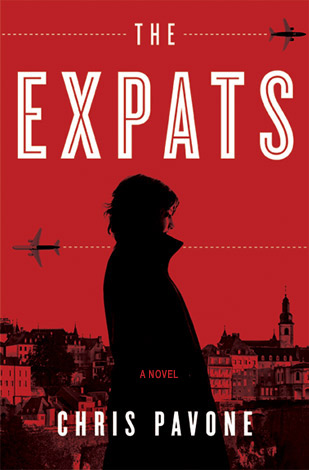
I typically don’t read spy novels or thrillers, but I was looking for a quick read while on a trip that would be entertaining. Chris Pavone’s debut novel “Expats” was so highly recommended on its book jacket (in retrospect don’t trust these) by Patricia Cornwell, John Grisham and others that I thought surely this would be it. Grisham even compared it to the early works of Ken Follet, Frederick Forsyth and Robert Ludlum; oh, but if only this were true.
At the beginning, “Expats” is quite promising and the idea of it intriguing. A husband (Dexter) gets a new job overseas as a computer security analyst for a high-paying client, which leads his wife (Kate) to decide to quit her secret life as a CIA spy and come clean living as an expat with him in Luxembourg. She seeks to end the duplicity in their marriage from her CIA days and to become a stay-at-home mom to their two sons learning the ways of a foreign country. But life gets too boring for Kate, sitting around dreading the laundry and vacant other moms! And soon suspicions lead her back to undercover work, first in regards to a couple she senses aren’t whom they say are, and ultimately to her husband who apparently has secrets of his own. (Quite a marriage.)
The whole expat atmosphere and deceit within the marriage propel the novel and make the plot interesting. But intermixed flashbacks of Kate’s CIA past confuse and distract from the main storytelling. Also the slew of twists at the end are a turn off, as the tireless scheming (I agree here with the Times’ Janet Maslin) “exceeds all sane expectations.” And I mean that in a uncomplimentary way. It turns pretty nuts. I had to fight my way through to finish it, as it no longer seemed plausible or interesting to me. What starts out promising, spins off the rails in rapid form towards the end. Continue reading
The Cat’s Table
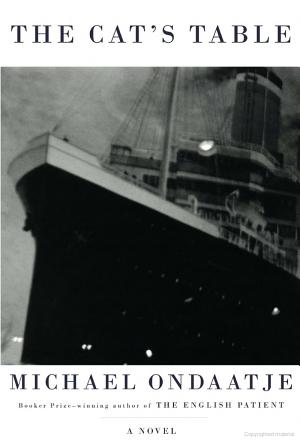
“The Cat’s Table” received considerable hype and good press when it came out this past October. Author Michael Ondaatje had won the Booker Prize for “The English Patient” in 1992 and his writing has long been revered. This novel seemed especially interesting in its premise about a 11-year-old boy’s unaccompanied three-week voyage on a ship from Sri Lanka to England in the early 1950’s. How adventurous and romantic a notion! I was definitely game for such a journey, particularly if it was based on Ondaatje’s own sea excursion when he was a boy. The book cover, too, of a large ship drew me to it like a chain hooked to an anchor. I would devour this story in no time!
Only trouble was, it didn’t exactly happen like that. In fact, I struggled in parts to stay with it and found the book took a considerable time to get through. Here I wanted to love it, and yet my mind, especially at the beginning was wandering off thinking about other things. Apparently, most readers liked the beginning of “Cat’s Table,” but some found it too disjointed toward the end. I was the opposite; I found the beginning rather hard to get into (despite the relatively easy style) but became more into it toward the end.
The start of the novel entails descriptions of various characters on the ship in short two to three page chapters. There’s the main character, Michael, and his boy pals, Cassius and Ramadhin who he runs around the ship getting into mischief with; then there’s the mishmash group of insignificants assigned with the boys to dine at the “cat’s table,” the one farthest away from the Captain’s. The details onboard are all quite charming, yet more than 100 pages into the book, I found myself grasping to find any semblance of a story. For heaven sakes move this ship along; will anything (ever) come of it?! Luckily, not long after that the waters start to churn so to speak and things become more interesting and resonant.
Thanks in part to Michael’s 17-year-old cousin Emily onboard who spicens things up and might be involved in a prisoner’s escape plans on the ship. The novel, too, opens up more in its storytelling and begins to intersperse Michael’s time on the ship with his life many years later, looking back on the trip. His nostalgia for the journey and how it affected him is quite poignant and pivotal to his coming of age. Years later, he ends up marrying Ramadhin’s sister and reconnects to other passengers, including the semi-mysterious Emily.
The novel is quite a subtle and intimate read, if you’re looking for a lot of action and adventure, this might not be your cup of tea. Yet it snuck up on me in due time. By the end, I could feel the weight of its voyage and how it altered Michael and others sitting at the ship’s cat’s table. For more info, check out author Michael Ondaatje being interviewed about the book on PBS. Continue reading
Posted in Books
2 Comments
Salmon Fishing in the Yemen

My book club recently picked “Salmon Fishing in the Yemen” because it seemed a more uplifting, lighter story than the dark, heavy reads we usually get to. And it turned out to fill that niche quite nicely. It’s a satirical, different kind of novel that builds on the theme that having faith in the impossible can be quite a good thing.
Written in the form of emails, letters, reports and diary entries, the novel is about a British fisheries scientist (Dr. Alfred Jones) who is called upon to somehow introduce salmon and fly-fishing into the country of Yemen. It’s all part of a dream of a visionary sheikh who loves fishing and believes it will have a beneficial effect on his country. The British prime minister’s office latches on to the idea as well, in its search for a positive, feel-good story about the U.K. coming out of the Middle East instead of war.
Yet to Alfred the idea is totally absurd as salmon aren’t suited to the Yemen’s desert conditions. Regardless he’s pressured into the project, coordinating it with help of the sheikh’s U.K. agent Harriet Chetwode-Talbot. The two make a dynamic team (one nerdy, the other sharp and elegant) along with the sheikh who inspires them to reach beyond what seems possible to reach their goal. Along the way they face various obstacles, including self-serving bosses and politicians, who are spoofed in the book as pompous asses, as well as Dr. Jones’s unhelpful, unloving wife who provides no encouragement and takes off to another country for work.
Will the project succeed? Will Harriet get together with Alfred? You won’t know until the very end. But the nice thing is it inspires you to believe in salmon in the Yemen, as it does Alfred, whose life is transformed by the project. In that way, it’s all quite uplifting. My only qualms with the whimsical book is that the narrative is a bit uneven with its various dispatches from different characters; some of which you want to read, others not so much. And the ending seemed perhaps as whimsical to believe as its salmon-in-the-desert premise, continuing its fairy tale-like quality.
Regardless I’m looking forward to it being released as a movie on March 9 with Ewan McGregor and Emily Blunt. I suspect it will be a bit different than the book version, with more comedy, romance and perhaps a brighter ending. Continue reading
Posted in Books
Leave a comment
